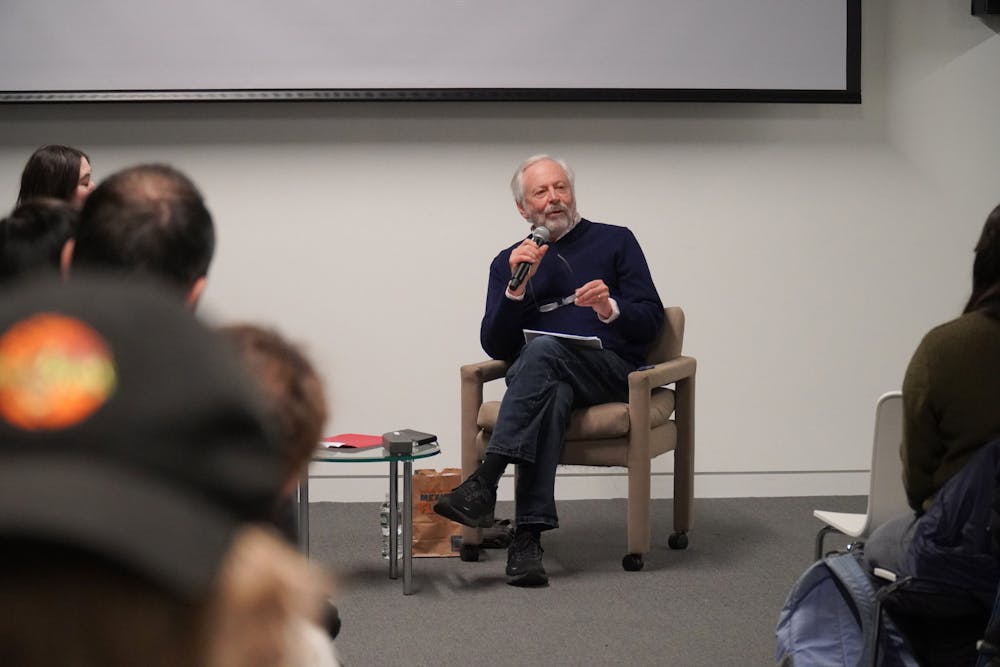
Penn Political Union hosted a discussion with political science professor Ian Lustick discussing free speech and the criteria for guest speakers in a university setting.
Penn Political Union president and College sophomore Mia Antonacci moderated the event, focusing on the question of whether it is “appropriate to prohibit individuals from speaking at a university based on the falsehood of their statements.” Around 30 people attended the discussion on Feb. 7, which took place at the Perelman Center for Political Science and Economics.
Lustick shared his view that “even false information should have the right to be said.” He said that the main criterion for prohibiting a speaker should depend not on the falsehood of their statements, but rather whether those claims can help the university community “make better arguments.”
Lustick emphasized that the progression of science and learning requires making mistakes.
“The idea that even things that aren’t true shouldn’t be allowed to be said doesn’t make any sense at all in a university when the whole point is to do two things: ask questions and make arguments,” he said.
In December, PPU co-hosted a panel with the Foundation for Individual Rights and Expression on the topic of universities taking stances on political and social issues. Antonacci, who is a campus scholar with FIRE, noted the challenges and conflicts that arise when visiting speakers’ free speech affects communities across campus.
She emphasized the importance of dialogues, such as the PPU discussion, that encourage students to challenge their assumptions and develop critical thinking skills.
“We want to pass our classes and we want a good GPA, which is valid,” Antonacci said. “I just think sometimes we have to look external to our courses and things that our minds are so focused on, to really get a better holistic sense of what's going on in the world and what we should engage with and expect.”
College junior Maya El-Sharif, who helped spearhead the event, said that she aimed to organize a conversation specifically focused on speaker policies. She referenced other controversial issues, such as abortion and gun rights, that PPU has readily discussed in the past.
“It is our job, I feel like as an organization, to facilitate spaces to have these conversations, and it's just our job to make sure that they're respectful and in a way that people can feel safe,” El-Sharif said.
Lustick told The Daily Pennsylvanian that he was “disappointed” by the reluctance of many institutions, centers, and departments to hold events to help students engage with the current political climate.
“I give the Andrea Mitchell Center and the PPU credit that they have had the courage to talk about something which doesn't seem like it should take that much courage to discuss: academic freedom,” he said.
College senior Akhilesh Tumu, who attended the event, said that he believed in the importance of the topic of academic freedom for speakers but worried about the practicality of Lustick’s theories.
Wharton sophomore Sophia Zhang said that she appreciated how Lustick’s discussion of free speech included his research on Israel-Palestine relations and broader global affairs.
“Usually when I think of free speech on campus, my mind automatically goes to the conflicts we had last semester,” she said. “But I think the professor did a good job of talking more about the academic perspective.”
Lustick referenced the University’s motto — Leges sine Moribus vanae — which translated from Latin means “Laws without morals are useless.”
“Rules forbidding speech will be in vain if the community norms are against them,” Lustick told the DP. “And the community norms are to ask questions, so don't bother trying to make rules that limit the questions [we can ask].”
The Daily Pennsylvanian is an independent, student-run newspaper. Please consider making a donation to support the coverage that shapes the University. Your generosity ensures a future of strong journalism at Penn.
Donate







